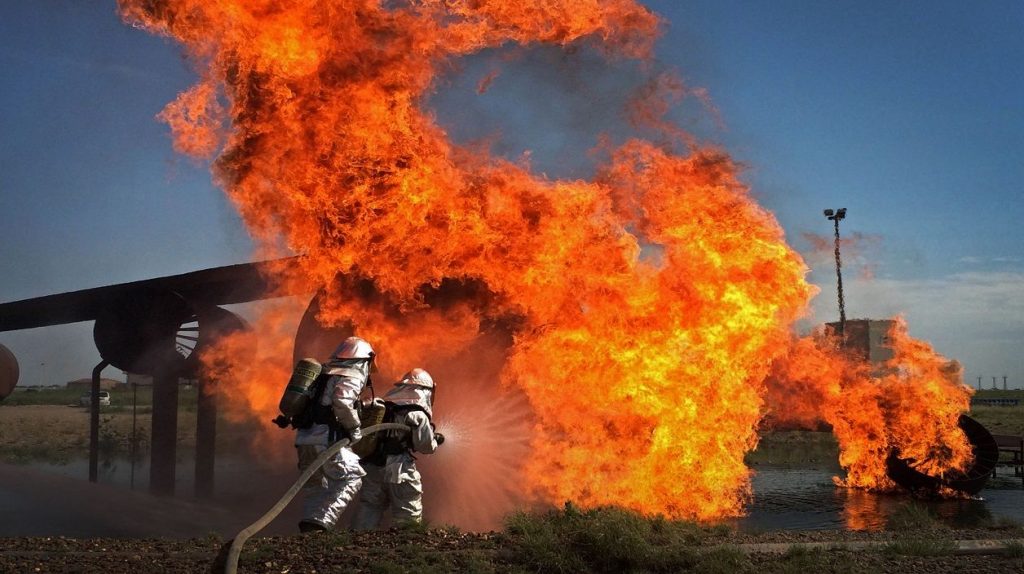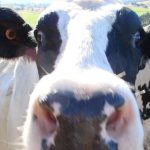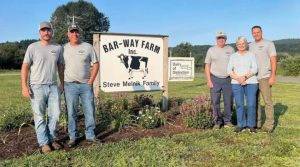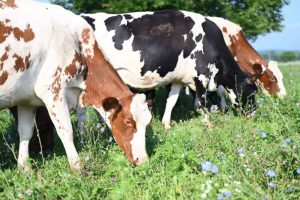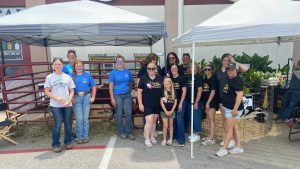
Art Schaap, owner of Highland Dairy, received national attention when firefighting foam used in training exercises at the nearby Cannon Air Force Base contaminated the water his cows rely on with PFAS.
This contamination was discovered in 2018, and, since then, Schaap has been trying to keep his sick cows alive while not being able to sell their milk. The cows cannot be used for beef production because of the PFAS contamination.
The U.S. Department of Agriculture announced this month a rule change that allows dairy farmers impacted by PFAS contamination to receive payments for their livestock through the Dairy Indemnity Payment Program.
In a press release, Schaap said that “finalizing this rule is a huge step in trying to get my life back to normal.”
Schaap is not the only dairy farmer whose livelihood has been affected by PFAS contamination due to exercises at nearby military bases. Farmers across the country have been forced to stop operations when PFAS contamination was discovered.
Contamination remains in the Clovis area
If Schaap chooses to buy new cows and restart milk production at Highland Dairy, he would not be eligible for DIPP money if those new cows become contaminated by PFAS. The PFAS contamination from the Cannon Air Force Base has not been fully cleaned up.
U.S. Rep. Teresa Leger-Fernández, a New Mexico Democrat, was one of those pushing for the USDA to change the rule. She said the Air Force has given intermediary support for water filters designed to remove PFAS from water supplies, but “we are still a long way away from the treatment plant the Air Force is in the process of building.”
With the contamination still impacting water supplies, the struggles aren’t over for Highland Dairy or other nearby areas also impacted by the contamination.
Leger Fernández said the timeline for building the treatment plant does not match the urgency of the problem.
“Until this treatment plant is completed, the Air Force has the clear authority and responsibility to provide relocation assistance to affected individuals,” she said. “This is why I secured an amendment in the 2022 [National Defense Authorization Act] that requires the Air Force to update Congress on PFAS contamination sites, acquisitions, and relocation status of private land and property contaminated by the military. It’s time for the Air Force to purchase contaminated land or property or relocate affected individuals who have been harmed by PFAS chemicals.”
She said she will do everything she can “to ensure that dairy farming has a thriving future in the Clovis area.”
Payments for lost milk production ended in 2020
Schaap previously received DIPP money for milk that he was unable to sell, but those payments ended about a year ago. Leger Fernández said that under President Donald Trump a cap was placed on the amount of payments a farmer could receive from the program. This stopped the payments Schaap had been receiving and, she said, the USDA did not provide him with any assistance or assurances that they were working on the problem.
“We pushed hard at every level of the federal government to get this rule change done as quickly as possible. I am glad that Art has finally received the compensation he deserves,” she said.
The rule change allows dairy farmers whose cows have ingested PFAS to receive DIPP money for milk for three months and, if the cows will not be able to be returned to production, the farmers can submit applications for payments for the cows.
Prior to the rule change, farmers were able to get payments for 18 months of lost milk production but could not get paid for the cows.
“Because efforts to investigate and address PFAS by the Federal government are ongoing and additional studies are needed to understand how to significantly reduce accumulated PFAS levels in dairy cows, affected cows may be determined likely to be not marketable for a lengthy duration,” the rule states.
Work to address PFAS is not over
Beverly Idsinga, the executive director of Dairy Producers of New Mexico, described the contamination as “tragic.”
“While the impact on dairy farms has been limited in its scope, the emotional and financial damage to the affected dairy is substantial,” she said in a press release.
The rule change is not the end of the fight for dairy farmers. Idsinga said “efforts must now continue to rectify this problem, remediate the contamination and eliminate any risk of other farms being impacted in the future.”
Leger Fernández also said that it is important to prevent future incidents of PFAS contamination from occurring.
“Our government must be cognizant of the chemicals it is using and how the chemicals impact the people and environment around them,” she said.
She highlighted the U.S. House of Representatives passing the PFAS Action Act earlier this year, which designates two types of PFAS chemicals, PFOA and PFOS, as hazardous substances and requires the EPA to establish national water quality standards for those chemicals. Leger Fernandez pushed through an amendment to that bill that includes protections for food supplies.
“As we know from what happened in Clovis, it’s important that we monitor not only drinking water but also the water that is used for livestock and farming. This is why I passed an amendment to the PFAS Action Act to ensure that the EPA’s testing regime and risk communication strategy consider the dangers of PFAS to water used for agriculture as well,” she said.
The PFAS Action Act has not passed the U.S. Senate.
Leger Fernández said there is regular monitoring for PFAS at the dairy farms in New Mexico.
“There is delicious cheese and milk coming out of these farms, and we should support our local farmers. I am enjoying a green chile cheddar from Tucumcari Mountain dairy right now,” she said.
